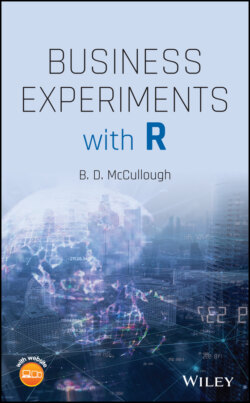Читать книгу Business Experiments with R - B. D. McCullough - Страница 14
1 Why Experiment?
ОглавлениеWe can learn from data, but what we can learn depends on the way the data were generated. When nature generates the data and all variables are free to operate as they will, it is very easy to learn about correlations. Very often though, we don't need to know that price decreases are correlated with increases in quantity sold, but we need to know by how much the quantity sold will increase when price is decreased by a specific amount, and correlations are not up to this task. To learn about causation, we need to restrict the way some variables can act, and this can only be done with an experiment. We don't need sophisticated statistical methods to conduct experiments; the statistics learned in a first non‐calculus‐based statistics course often is more than sufficient to conduct a wide variety of useful experiments. Before conducting any experiments, we need to be very precise about the reasons that observational data are not up to the task of yielding causal insights.
After reading this chapter, students should:
Distinguish between observational and experimental data.
Understand that observational data analysis identifies correlation, but cannot prove causality.
Know why it is difficult to establish causality with observational data.
Understand that an experiment is a systematic effort to collect exactly the data you need to inform a decision.
Explain the four key steps in any experiment.
State the “Big Three” criteria for causality.
Identify the conditions that make experiments feasible and cost effective.
Give examples of how experiments can be used to inform specific business decisions.
Understand the difference between a tactical experiment designed to inform a business decision and an experiment designed to test a scientific theory.
